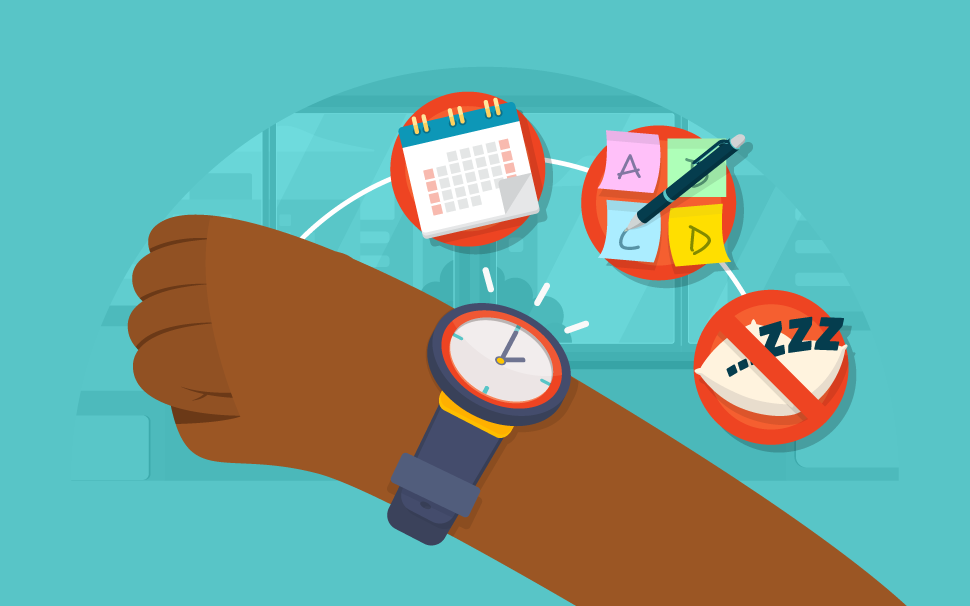Planning is a cornerstone of effective time management. Without outlining goals and setting up an appropriate timeline, it’s all too easy to drift into low-priority tasks, procrastinate, or struggle with decision fatigue as you continually switch between activities without clear direction. This can have a detrimental impact on the quality of your work.
What is time management?
Time management involves structuring your work to focus on important tasks and maximize productivity. It allows you to prioritize activities so that you can make the most of your day. Practicing time management can make space for rest and self-care.
Why is time management important?
Time management skills help to manage time effectively, leading to better task management, higher productivity, and a better work-life balance.
Skills such as staying organized, prioritizing tasks, setting goals, strong communication skills, and effective planning are essential for successful time management. Employees may experience missed deadlines, poor work quality, and burnout without proper time management.
What strategies can I use to better manage my time?

Understand your time usage in order to be more efficient.
- Tracking your time can help you identify areas or habits that are blocking you from reaching your goals.
- Time-tracking tools like RescueTime can tell you how many hours you’re productive in a day versus how much time you’re spending on non-work-related activities.
- Knowing where your time is going can help you create a budget and maximize productivity.
- Keeping a time log can help you determine how you use your time.
- Evaluate the results to identify which tasks require the most time and when you are most productive.
How to better manage your time at work
- Plan and control time to maximize productivity
- Improve work quality, reduce stress, and have more time for strategic projects.
- Reduce procrastination and increase self-confidence.
- Identify and address time management issues at work.
- Utilize personal time management techniques to reclaim lost hours of the day.
Learn to delegate/outsource
- Delegating or outsourcing can save time and reduce workload.
- Assign tasks to competent team members or hire an experienced freelancer.
- Investing in in-house training is beneficial in the long run.
Stick to a daily schedule.
- Create a daily schedule with realistic timelines and time buffers.
- Avoid distractions during work hours by closing browser tabs and turning off phones.
- Self-discipline is key to sticking to the schedule and achieving success.
- Create a list of tasks for the next day before leaving work.
- Writing out your plans allows your subconscious to work on them while you sleep.
- Spend time creating a clear plan in the morning to avoid jumping between tasks.
Tackle the most difficult task first.
- The Eat That Frog productivity method recommends tackling the most difficult task first.
- Leadership expert Brian Tracy devised this method to help people who tend to procrastinate or have trouble avoiding distractions.
- Once the biggest, most difficult, and most important task is completed, then other tasks can be addressed.
Start with the most important task.
- Identify the two or three most important tasks to complete each morning.
- Complete those tasks before anything else.
- Use the momentum from completing those tasks to finish less important tasks.
Batch-process similar tasks
- Group similar tasks together to work on them efficiently.
- Schedule client meetings for Wednesdays and Thursdays.
- Set aside time each day to respond to emails and generate reports.
- Don’t answer emails and phone calls throughout the day, but instead, schedule a specific time for them.
- This will help your brain stay focused on one type of task rather than having to switch gears constantly.
Set reasonable time limits.
- Parkinson’s law suggests that tasks take as much time as is allotted for them to be completed.
- Allocating a full day to complete two tasks that should take only three hours is inefficient.
- Setting reasonable time limits can help ensure tasks are completed in a timely manner.
- The Pomodoro Technique can help you break up tasks into 25-minute chunks with short breaks in between.
- Timeboxing allows you to block out varied amounts of time for each task.
- Setting time limits on tasks helps increase productivity and reduce mental strain.
Keep things organized
- Maintain a clean work desk to reduce stress and anxiety.
- Create a system for organizing digital files for easy access.
- Use a calendar to organize life buckets and differentiate categories.
- Establish a filing system to keep documents organized and easily accessible.
- Unsubscribe from emails that are no longer needed.
- Automate repetitive tasks or processes to increase efficiency.
Use time management tools
- Utilize Slack for organized team communications.
- Store, share, and back up files with Dropbox or OneDrive.
- Keep on top of schedules with Google Calendar and Outlook Calendar.
Remove non-essential tasks/activities.
- Identify what is significant and deserves your time.
- Remove non-essential tasks/activities.
- Free up more of your time for important things.
Eliminate distractions
- Identify and eliminate the top two distractions for two weeks.
- Shut the door, close tabs, and turn off messaging notifications to limit interruptions.
- Get enough sleep, drink water, and eat healthily to stay focused during the workday.
- Find a quiet place and sit in a comfortable chair.
- Put on some music to block out noise and close all browser tabs.
- Set your phone on silent, put it away, and focus solely on the task at hand.
Prioritize wisely
- Start by eliminating tasks that are not necessary.
- Prioritize tasks based on importance and urgency.
- Tasks that are important but not urgent, or urgent but not important, should be delegated or set aside to do later.
- Creating a time management matrix can help prioritize activities.
- Use the Eisenhower matrix to organize tasks into four quadrants: important and urgent, important but not urgent, urgent but not important, and not urgent and not important.
- Evaluating how time is currently spent can be done by inserting items from a to-do list into the matrix.
Learn to say “no.”
- Making time commitments can be beneficial, but too many can backfire.
- Only commit to tasks that are meaningful and within your capacity.
- Learning how to say “no” is essential in order to manage your time and focus on the most important things.
- Delegate tasks when necessary in order to free up your own time.
- Prioritize the tasks that will add the most value rather than a lot of activities with little or no benefit.
Set goals
- Time management is an essential skill to possess.
- Effective goal-setting is key to managing time wisely.
- Focus on actions that help you achieve your goals in order to use time more efficiently.
- Formulate SMART goals to ensure you remain on the right track.
- Keep a big picture in mind when setting goals to know what results you are expecting to attain.
Create a time audit
- A time audit is a useful tool for tracking how you manage your time.
- Time management starts with understanding where your time is going.
- Use the report to identify time-wasting activities and make adjustments accordingly.
- You can record your daily activities on paper or with time management apps such as aTimeLogger and Toggl.
- Or download an app like RescueTime, Toggl, or Calendar to track activities for a week.
- Spending a few minutes to track your time can help you understand where it goes and make better decisions about how to use it.
Use a to-do list, but don’t abandon tasks.
- Creating to-do lists for each goal and project can help keep you focused and motivated.
- It also helps to improve effective planning and stress management skills.
- Set a limit on the number of tasks you are working on at any given time.
- Interruptions may prevent you from completing a task, so make sure to return to it once you are able.
Change your schedule
- Waking up an hour earlier can help with time management.
- Consider waking up earlier on the weekends and reducing TV time.
- Utilizing the early morning hours for exercise, planning, emails, and side projects can be beneficial.
Schedule your time
- Scheduling your time can reduce stress and increase productivity.
- Doing so gives you a greater feeling of control and increases self-esteem.
- It also improves your sense of personal power.
Use an online calendar.
- Online calendars provide a convenient way to manage time and schedule events.
- Popular online calendar services include Google Calendar, Outlook, and Apple Calendar.
- Online calendars offer features such as reminders, recurring events, and time blocks.
- Using digital calendars is often more efficient than paper-based scheduling and planning.
- Digital calendars can be accessed through multiple devices and integrated with email accounts for streamlined scheduling.
Develop emotional intelligence
- Emotional intelligence is the ability to identify and manage one’s own emotions and those of others.
- Those with a high EI possess qualities such as self-motivation, awareness of strengths and weaknesses, and the ability to set boundaries.
- Having a high EI can help increase productivity by assisting in completing tasks and achieving goals.
Sleep hygiene
- Sleep is essential for productivity and optimal functioning.
- Sleep hygiene involves having a consistent bedtime and wake-up time, as well as avoiding digital devices before bed.
- Relaxing activities can help promote better sleep quality.
Stay Healthy
- Investing time in yourself is important for physical and mental health.
- Utilize built-in software on electronic devices to help maintain digital well-being, such as setting time limits or using blue light blockers and grayscale mode.
- Set a nightly shut-off time for all digital devices to give your mind time to relax and improve your sleep schedule.
- Poor time management and too much screen time can lead to fatigue, moodiness, and illness.
- Take time to recognize accomplishments before moving on to the next activity.
Resources
10 tips for mastering time management at work from Slack.com
14 Time Management Best Practices to Improve Productivity from Bloomfire.com
15 Time Management Best Practices for Greater Productivity from Calendar.com
18 Time Management Tips To Boost Productivity from Asana.com.
15 time-management Tips That Will Change Your Life from Proofhub.com
